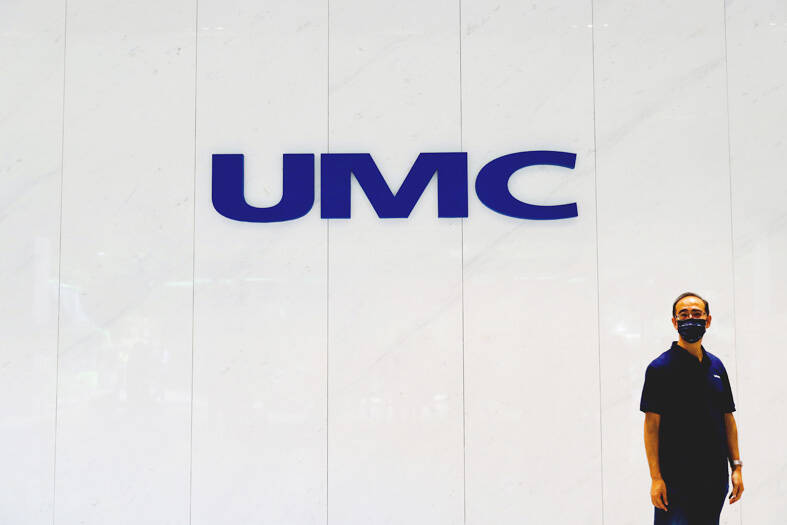United Microelectronics Corp (UMC, 聯電) yesterday said it has signed a long-term agreement with Infineon Technologies AG to increase its 40-nanometer capacity for the production of Infineon’s automotive microcontrollers.
Infineon’s high-performance microcontroller products, based on the company’s embedded non-volatile memories technology, would be produced at UMC’s 12-inch fab in Singapore, the companies said in a joint statement.
Infineon said this year it is increasing the amount of automotive microcontrollers it sells to almost 1 million per day to cope with an increase in demand for microcontrollers, which are used in a wide range of functions in vehicles.

Photo: Ritchie B. Tongo, EPA-EFE
“With this strategic cooperation agreement, we have secured additional long-term capacity to serve Infineon’s customers in the fast-growing automotive market,” Infineon chief operating officer Rutger Wijburg said in the statement. “Going forward, Infineon and UMC will further deepen automotive collaboration in the areas of microcontroller, power management and connectivity solutions.”
The multi-year supply agreement further reinforces UMC’s long-standing partnership with Infineon across various automotive, artificial intelligence of things and 5G market segments, UMC copresident Jason Wang (王石) said in the statement.
Since 2019, UMC has tripled its shipments of automotive products, Wang said.
The chipmaker said it expects that momentum to continue as demand for automotive semiconductors rises.
“Given our specialty technology leadership, diversified manufacturing footprint, and focus on quality and operational excellence, we look forward to deepening our collaborations with world-class automotive leaders such as Infineon,” Wang said.
Automotive chips made up about 9 percent of UMC’s overall revenue of NT$278.71 billion (US$9.11 billion) last year, the company told investors in January.
It said its revenue from automotive chips grew 82 percent annually last year, and attributed the increase to the growing trend of vehicle electrification and automation.
With demand for chips used in computers and mobile phones weakening, automotive chips have become an important driving force for UMC, the company said.

Semiconductor business between Taiwan and the US is a “win-win” model for both sides given the high level of complementarity, the government said yesterday responding to tariff threats from US President Donald Trump. Home to the world’s largest contract chipmaker, Taiwan Semiconductor Manufacturing Co (TSMC, 台積電), Taiwan is a key link in the global technology supply chain for companies such as Apple Inc and Nvidia Corp. Trump said on Monday he plans to impose tariffs on imported chips, pharmaceuticals and steel in an effort to get the producers to make them in the US. “Taiwan and the US semiconductor and other technology industries

SMALL AND EFFICIENT: The Chinese AI app’s initial success has spurred worries in the US that its tech giants’ massive AI spending needs re-evaluation, a market strategist said Chinese artificial intelligence (AI) start-up DeepSeek’s (深度求索) eponymous AI assistant rocketed to the top of Apple Inc’s iPhone download charts, stirring doubts in Silicon Valley about the strength of the US’ technological dominance. The app’s underlying AI model is widely seen as competitive with OpenAI and Meta Platforms Inc’s latest. Its claim that it cost much less to train and develop triggered share moves across Asia’s supply chain. Chinese tech firms linked to DeepSeek, such as Iflytek Co (科大訊飛), surged yesterday, while chipmaking tool makers like Advantest Corp slumped on the potential threat to demand for Nvidia Corp’s AI accelerators. US stock

The US Federal Reserve is expected to announce a pause in rate cuts on Wednesday, as policymakers look to continue tackling inflation under close and vocal scrutiny from US President Donald Trump. The Fed cut its key lending rate by a full percentage point in the final four months of last year and indicated it would move more cautiously going forward amid an uptick in inflation away from its long-term target of 2 percent. “I think they will do nothing, and I think they should do nothing,” Federal Reserve Bank of St Louis former president Jim Bullard said. “I think the

SUBSIDIES: The nominee for commerce secretary indicated the Trump administration wants to put its stamp on the plan, but not unravel it entirely US President Donald Trump’s pick to lead the agency in charge of a US$52 billion semiconductor subsidy program declined to give it unqualified support, raising questions about the disbursement of funds to companies like Intel Corp and Taiwan Semiconductor Manufacturing Co (台積電). “I can’t say that I can honor something I haven’t read,” Howard Lutnick, Trump’s nominee for commerce secretary, said of the binding CHIPS and Science Act awards in a confirmation hearing on Wednesday. “To the extent monies have been disbursed, I would commit to rigorously enforcing documents that have been signed by those companies to make sure we get